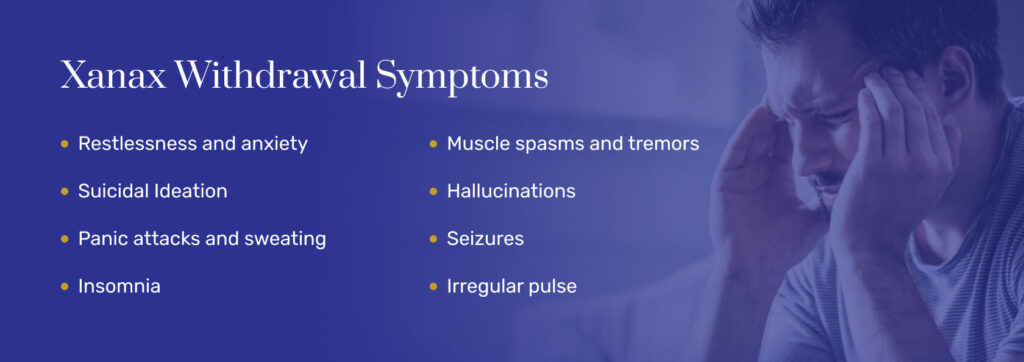Whether you’re taking Xanax as prescribed by your doctor or using it recreationally, it’s not a drug you can stop taking “cold turkey.” Quitting Xanax abruptly can cause undesirable withdrawal symptoms, some of which may require medical intervention. In the worst cases, benzodiazepine withdrawal can be deadly. Instead, you need a gradual tapering process that’s guided by a medical professional. Let’s explore what this can look like and why it’s important. If you’re struggling to stop using Xanax safely, a Florida Inpatient drug rehab center can provide medically supervised detox and structured tapering support.
Xanax, Benzodiazepines & Addiction
Xanax, which is known generically as alprazolam, and other benzodiazepines can be both physically and mentally addictive. These drugs are powerful sedatives, and they have a high likelihood of abuse and dependence with continued use. Because of this, most prescriptions for benzos are given on a short-term basis.
Are you or someone you know struggling with addiction?
I may have a problem I am concerned for a loved oneIt’s important to follow prescription guidelines, and never take Xanax and other benzodiazepines without a doctor’s prescription. However, even individuals who use Xanax in smaller doses can have trouble quitting this drug.
Once dependence has formed, a tapered approach to withdrawal is needed. If you suddenly stop taking Xanax without medical supervision, it can be dangerous.
Xanax Tapering Guidelines & Schedule
Generally, the max daily dose for severe anxiety disorder is 4 mg of Xanax. For those who use Xanax for panic disorder, the maximum daily dose may be around 10 mg per day.
The FDA asserts that those who take Xanax in doses of 4 mg or more may have more difficulty tapering down to zero than those who take smaller doses per day.
Oftentimes, doctors will recommend switching to a long-acting benzodiazepine before initiating a taper. Drugs with long half-lives tend to work better for tapers than short-acting benzodiazepines.
Here is a sample Xanax tapering schedule:
| Week(s) | Reduction | Example (starting at 4mg) |
|---|---|---|
| Week 1 | Reduce by 25% over two weeks | 3.5 mg |
| Week 2 | 3 mg | |
| Week 3 | Reduce to 50% of original dose over two weeks | 3.5 mg |
| Week 4 | 2 mg | |
| Weeks 5-8 | Maintain current dose amount | 2 mg |
| Week 9+ | 25% reduction in dose every two weeks until reaching zero | 1.5 mg at week 9, 1 mg at week 11, 0.5 mg at week 13, and 0 mg at week 15 |
Your specific tapering schedule will be personalized by your doctor. If you begin to experience withdrawal symptoms, they may slow your taper, reducing your weekly dose by smaller increments or even keeping you at the same dose for a while.

The Dangers of Tapering Off Incorrectly
Tapering off Xanax on your own could result in adverse effects and will put you at risk of experiencing intense withdrawal symptoms. This can not only be dangerous, but it can also greatly increase your likelihood of relapse. People want to make the discomfort of withdrawal go away, so they return to Xanax abuse.
Here are some of the symptoms you can expect if you quit Xanax use cold turkey or taper incorrectly:
Restlessness
Anxiety
Suicidal ideation
Panic attacks
Hallucinations
Insomnia
Muscle spasms
Irregular pulse
Tremors
Sweating
Seizures
Intense cases of benzodiazepine withdrawal can lead to coma and even death. You should never attempt to design and manage your own taper or detox from Xanax or any other benzodiazepine. Professional help is needed.
Symptoms like increased irritability, anxiety, and insomnia typically last for a few days, but they can persist for weeks or months, depending on the severity of the drug dependency.
Xanax Withdrawal: A Timeline
While it’s not possible to perfectly predict what your withdrawal and tapering experience will be like, or whether you’ll have any withdrawal symptoms at all, here’s a glimpse into what many people experience.
Day 1
Withdrawal symptoms begin and are typically mild.
Day 2
Physical symptoms may reach their peak, such as tremors, sweating, muscle spasms, and an irregular heartbeat.
Day 3
Psychological symptoms increase, such as anxiety, insomnia, restlessness, hallucinations, panic attacks, and suicidal ideation.
Days 4 to 5
Psychological symptoms persist but physical symptoms reduce.
Days 6 to 7
Physical symptoms are mild or have resolved and psychological symptoms are becoming milder.
Days 8 to 14
Physical symptoms are typically gone by this time and psychological symptoms gradually go away. Some symptoms like anxiety and cravings for Xanax may continue for several weeks or a few months.
Why Do Withdrawal Symptoms Occur?
Withdrawal symptoms occur because the body and brain have become accustomed to the presence of a drug. When that drug is absent, the body is thrown into a state of imbalance.
Withdrawal symptoms are often opposite effects to those brought on by a substance. For example, Xanax manages anxiety, so one of the withdrawal symptoms associated with it is anxiety.
Rebound effects are associated with benzodiazepine withdrawal. This is a return of symptoms that the medication was originally intended to manage. For Xanax, rebound effects include anxiety and insomnia.
Symptoms like increased irritability, anxiety, and insomnia typically last for a few days, but they can persist for weeks or months, depending on the severity of the drug dependency.

Can Properly Tapering Off Xanax Help With Withdrawal Symptoms?
Yes, tapering off Xanax can control withdrawal symptoms. While the tapering process might not eliminate withdrawal symptoms fully, it will greatly reduce their severity.
You’ll work with a doctor to manage withdrawal symptoms during this process, as your feedback will help them assess the right dosage levels for your taper. In addition to raising your tapering dosage if you experience symptoms, a doctor will also be able to treat specific withdrawal symptoms as needed. They may incorporate other medications that won’t interfere with your tapering schedule to give you relief from undesirable symptoms.


Can You Quit Xanax Cold Turkey?
Support After Medical Detox
Both during and after detox, individuals who have been misusing Xanax are encouraged to explore therapy and support groups. Depending on your needs and circumstances, you might consider a residential rehab as well. Therapy will help you get to the bottom of why you abused Xanax and equip you with healthy tools that will help you avoid abusing substances in the future. Most often, this therapy takes place in both individual and group settings.
While there is no cure for addiction, you can successfully manage your substance use disorder for the rest of your life. You just need the right help and support to find your path to recovery. Long-term recovery support is available through an Indiana inpatient drug rehab that helps clients manage benzodiazepine dependence and rebuild healthy coping habits.
While everyone’s experience can differ, symptoms of Xanax withdrawal can start as early as 8 to 12 hours after you stop taking it, because it doesn’t stay in your system very long. Symptoms typically continue for a week to a few weeks.
You don’t necessarily need to be in an inpatient facility to taper off Xanax – with a weeks-long tapering schedule, your doctor will typically monitor your progress on an outpatient basis so you can continue living at home. But it’s not safe to taper your Xanax by yourself without medical supervision.
You’ve heard us mention that Xanax tapering and withdrawal varies from person to person. While it’s not possible to predict your exact experience because everyone’s body reacts differently, these are the key factors that will affect your withdrawal symptoms and tapering schedule:
-How long you’ve been taking Xanax
-Your daily dosage
-Whether you’re using any other substances
-Health conditions and circumstances like pregnancy, panic disorders, or PTSD
-How slow or quickly you taper
-Your age, with those over 65 being at higher risk for complications
-How severe your anxiety or other psychological symptoms were before you started taking Xanax
You’ve heard us mention that Xanax tapering and withdrawal varies from person to person. While it’s not possible to predict your exact experience because everyone’s body reacts differently, these are the key factors that will affect your withdrawal symptoms and tapering schedule:
-How long you’ve been taking Xanax
-Your daily dosage
-Whether you’re using any other substances
-Health conditions and circumstances like pregnancy, panic disorders, or PTSD
-How slow or quickly you taper
-Your age, with those over 65 being at higher risk for complications
-How severe your anxiety or other psychological symptoms were before you started taking Xanax
- Alprazolam (May 2021). National Library of Medicine.
- A Review of Alprazolam Use, Misuse, and Withdrawal. (March 2018). Journal of Addiction Medicine.
- Experiences With Benzodiazepine Use, Tapering, and Discontinuation: An Internet Survey. (April 2022). SAGE Journals.
- Benzodiazepines Remain Important Therapeutic Options in Psychiatric Practice. (August 2022). Psychotherapy and Psychosomatics.
- Challenges of the Pharmacological Management of Benzodiazepine Withdrawal, Dependence, and Discontinuation. (February 2018). Therapeutic Advances in Psychopharmacology.
- Benzodiazepine Withdrawal: Potentially Fatal, Commonly Missed. (December 2001). Emergency Medicine News.
- Withdrawal Syndromes. (October 2022). StatPearls.
- Effective Treatments for PTSD: Helping Patients Taper From Benzodiazepines. National Center for PTSD.
- Benzodiazepines: Uses, Dangers, and Clinical Considerations. (September 2021). Neurology International.
- Your Guide to Xanax Withdrawal Symptoms and Treatment Options. Healthline. Accessed April 1st, 2025.















